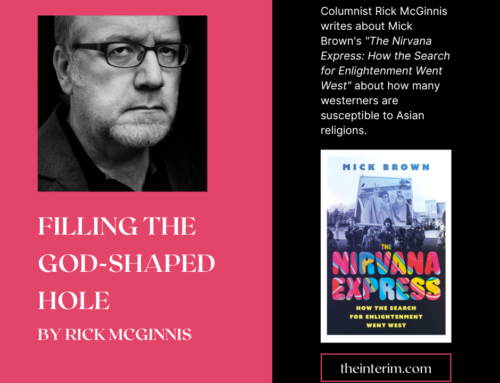 I envy people who’ve maintained a constant connection to their faith, but not just for the bedrock of moral certainty that’s been beneath their feet their entire life. If you haven’t walked a meandering path all over the political and spiritual landscape, you probably won’t have experienced the panic that overwhelms you the morning after you’ve returned from that tacitly secular, hyperbolically ambivalent place generally accepted today as the mainstream. You might be free of confusion and nagging unease for the first time in years, but your peace of mind will be brought up short by the question: What am I going to read now?
I envy people who’ve maintained a constant connection to their faith, but not just for the bedrock of moral certainty that’s been beneath their feet their entire life. If you haven’t walked a meandering path all over the political and spiritual landscape, you probably won’t have experienced the panic that overwhelms you the morning after you’ve returned from that tacitly secular, hyperbolically ambivalent place generally accepted today as the mainstream. You might be free of confusion and nagging unease for the first time in years, but your peace of mind will be brought up short by the question: What am I going to read now?
For that matter, what am I going to watch, or listen to? It might seem like a flippant question, but if you either simmer or stew in modern culture – pop, middlebrow or high – you’ll know with a heart-stopping certainty that the vast majority of what’s in books or magazines, on TV, in movies or coming out of your radio or headphones has not been created with you in mind, and some of it wakes up in the morning eager to go about the business of offending you before lunch. Double the sickening effect of that anxious revelation if you’re in the business of writing books, playing music, or working in film, TV or theatre.
Which is why it feels miraculous to discover an entertainment actually conceived in sympathy with your view of the world, made with talent and skill. Poet Robert Eady’s novel The Octave Of All Souls was published late last year to predictable silence from the country’s critical media, though two sympathetic notices from outside the book pages have probably helped connect it with an audience that, being so little esteemed by publishers, is usually resigned to re-reading decades-old mystery novels.
No stranger to Interim readers, Eady has set his novel in Strathearn, a fictional small Ontario town, whose intimate scale makes it easy for him to tell a story about how lives intersect, with melancholy or even tragic effect. His narrator, a middle-aged spinster who remains nameless except for her initials, recalls the lives of just over a dozen of her fellow citizens, selected because they’ve taken up residence in the town’s cemetery in the past year.
It’s the narrator’s habit – it might even be dignified by being called a mission – to pray for their souls, regardless of what she felt about them in life. Prayer is private, however, so what we read, in the form of a series of letters to a friend who long ago moved away, are her memories, many of which are brutally frank and less than charitable. Columnist David Warren praised Eady’s book as “the most penetrating account of small-town Ontario life I have ever read,” and I’d agree, with a further admission that it ultimately made me grateful that I live in a big city.
It takes awhile before Eady allows J.T. to reveal much about herself, beyond her feelings about her friends and fellow townspeople, and when she does we get a story about fear and abandonment, despair, resignation and a return to faith, albeit one that persists despite a pitiful loneliness. It’s glimpsed briefly between the stories she tells about her now deceased-neighbours, but leads to a final revelation near the end of the book that’s quietly heartbreaking.
There’s nothing pollyannaish about Eady’s portrait of small-town life in The Octave Of All Souls, and he’s particularly unsparing in his brutal treatment of a character – a conservative Catholic and Latin mass devotee – whose sympathies most closely resemble his own. His story, full of disquieting reflections on daily life and filtered through a narrator troubled by her own nagging lapses as a Christian, is hardly a cheery, propagandistic encomium to life animated by faith, as lived by millions outside the secular “mainstream.” So why was it rejected by so many publishers that a tiny press, Editio Sanctus Martinus, ended up bringing it out, struggling to find readers unaided by Amazon or Chapters-Indigo?
It’s likely that the readers employed by large publishers – often young people on the shaky lower rungs of the publishing business – aren’t used to reading about people like J.T. much these days, at least not since they read Margaret Laurence’s The Stone Angel in high school, and with this in mind it’s hard not to wonder how many of these stalwarts of the literary canon would see print today. Of all the media, book publishing is the one on the furthest trailing edge of technological revolutions that might make this cultural gulf between readers and publishers less vast, but in the meantime, if you want to support writers like Robert Eady, you’ll have to resort to an envelope and a stamp: Editio Sanctus Martinus, P.O. Box 315, Combermere, Ont., K0J 10L.




